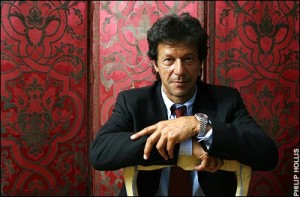Pakistan’s Imran Khan – playboy cricketer to PM? (Part 1))
Saturday, November 19th, 2011 4:52:58 by Awais Khan
(Reuters) – The road to Imran Khan’s palatial spread in the hills above Pakistan’s capital is a perfect metaphor for his vision of his political career: twisty and pot-holed, but ending in a grand estate.
Alone in the beginning but now surrounded by smaller buildings, the house itself is cool and pleasant, with Mughal-era swords arrayed on a coffee table and two playful dogs — one a German shepherd named Sheru — romping about the carefully manicured lawn.
"I built this house," Khan said as he sat on the shaded verandah eying the sweeping vista overlooking the city. "There was nothing here. It was scrub jungle all around. There was only a dirt track here."
For Khan, creating something from nothing could be the slogan for a much-chequered life.
A graduate from Oxford and very much a man-about-town in London in the late 1970s, he became one of the world’s most admired cricketers. He was captain of Pakistan’s team of talented but wayward stars and, with many whispers of autocracy, led them to win
cricket’s World Cup for the first and only time in 1992.
After years of fund-raising, Khan opened a cancer hospital in the memory of his mother in his native Lahore in 1994.
He is a conservative Muslim but was married to a Jewish heiress and then divorced, joined politics and for years been somewhat of a joke in Pakistan’s unruly democracy.
But in the past 15 years, through sheer force of will and a reputation for personal integrity, he has gone from political punch line to a superstar now attracting heavy-hitting politicians to his party, Pakistan Tehreek-i-Insaf (Pakistan’s Movement for Justice).
He — and a lot of other people — believe he could very well be Pakistan’s next prime minister.
Khan’s confidence stems from what he sees is a tsunami of support for the PTI in Pakistan as traditional parties falter amid charges and counter-charges of corruption and petty jealousies. On Oct 30, he staged a gigantic rally in Lahore that observers said
pulled between 100,000 and 200,000 people, one of the largest political rallies ever in Pakistan.
But Khan remains relatively untested. In the last 15 years, his party has only briefly held one seat in parliament — his. He has had tumultuous relationships with the established political parties as well as the military, the real decision maker in the
nuclear-armed nation of 180 million people.
He does not openly criticise the military but in a book on Pakistani politics published in September, he walks the line, saying: "Only a credible government can save and strengthen the Pakistan army by making sure it stays within its constitutional role.
We have no other choice: in order to survive, we have to make Pakistan a genuine democracy."
Khan also has a touchy relationship with the United States, Pakistan’s ally in the war on militancy and its biggest aid donor. He says that if he’s elected prime minister, he would end Pakistan’s cooperation in the fight against militants based in its tribal
areas, end the American drone campaign and refuse all U.S. aid, which totals some $20 billion since 2001.
REVOLUTIONARY
It may be all pie-in-the-sky, but Khan, 58, is nothing if not charismatic. Still athletic and craggily handsome with darting eyes and an intense demeanour, he can rarely sit still for long. He fidgets and twists, almost as if he were about to leap to his
feet and launch into his fearsome pace bowling.
"For a lot of people who don’t have hope in their political system, in a democratic system, he’s the one person they seem to have hope in," said a senior Western diplomat, who requested anonymity to speak about internal Pakistani politics.
"I think he’s an important phenomenon because he articulates the very real frustration of the country at a time when they need articulation."
And articulate he does. In an interview, Khan quickly lists Pakistan’s very serious economic problems: electricity shortages, crumbling railways, a crisis in education, massive unemployment and endemic corruption.
"We’ve hit rock bottom," he said. "It doesn’t get worse than this, where to qualify for any position of important public office, you have to have committed a crime."
For Khan, the current government headed by Asif Ali Zardari, the widower of Khan’s old Oxford classmate Benazir Bhutto, who was assassinated in 2007 after returning to Pakistan from self-imposed exile, is the most corrupt government Pakistan has ever seen.
Transparency International, which listed Pakistan as the 143rd most corrupt country in its 2010 corruption index, might agree.
As such, Khan believes in a fresh start for Pakistan, a country that, like his home above Islamabad, is a jungle ready to be cleared out and made anew. He believes Pakistan should wipe out the past and rebuild from a clean slate, with he as architect-in-chief.
"You only get out of this by a complete U-turn and what we call a New Pakistan."
He is calling not only for a new government, but a new political order, one based on what he says are the real ideals of Pakistan’s founding father, Muhammad Ali Jinnah, who worked to forge a homeland for South Asia’s Muslims before the bloody partition
in 1947 that created India and Pakistan.
Instead of fighting the Taliban militants, Khan said, Pakistan should enter into dialogue with them. He says if he were in power, he could end militancy in 90 days.
A senior Taliban commander and spokesman contacted by Reuters laughed off this idea and said they would continue the fight. "He is, in fact, living in a fool’s paradise," the commander said.
Tags: cricketer, Imran Khan, politicianShort URL: https://www.newspakistan.pk/?p=4089

















